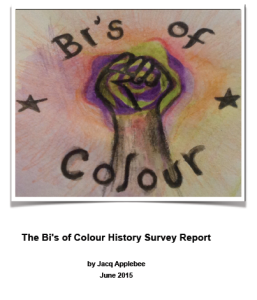Following the Complicated report on bisexual people’s experiences of services last month BiUK is pleased to be able to announce yet another important piece of grassroots research on bisexual experience: The Bi’s of Colour Survey Report conducted by Jacq Applebee, founder of the Bi’s of Colour group.
The experience of bisexual people of color has been woefully under-researched and neglected to date, with no UK studies focusing on this area. This is despite the fact that we know that people who experience multiple marginalisations through both their sexuality and their race or ethnicity have the worst mental health outcomes due to their experiences of intersecting oppressions, and discrimination on more than one dimension. This is, of course, a particularly vital issue in relation to bisexuality given that bisexual people in general have higher rates of mental health problems than either heterosexual, or lesbian and gay, people.
You can download the full report here: Bi’s of Colour Survey Report.

The report provides a thorough overview of the study, as well as a useful commentary, by Jacq Applebee, on the findings. It supports previous research on bisexuality, such as the double discrimination that bisexual people experience from both straight and lesbian/gay communities, and the difficulties that they face finding communities and support. It also demonstrates important and concerning facts about the experiences of bi people of color particularly, for example:
- The whiteness of offline and online bisexual and LGBT spaces and groups, such that bi’s of color often feel unwelcome, overly visible, or experience explicit racism and microaggressions, if they do access such spaces.
- Specific negative experiences such as being hypersexualised (on the basis of both sexuality and race), exoticised and fetishised, or used as the token person of color to demonstrate the supposed diversity of a community or group.
- Being presumed straight due to a lack of awareness of the LGBT history within communities of colour, and colonialist assumptions.
- Feeling excluded from certain spaces due to financial constraints, or because events take places in venues which many people do not feel comfortable in (university settings, or clubs and bars, for example).
Some people also spoke positively about their sense of inclusion in certain communities and groups which have been set up (some bisexual spaces, and QTIPOC spaces, for example).
The Bi’s of Colour study points to the desperate need for more sustained research in this area and far better resources to address the intersections between sexuality and race and ethnicity in general, and the experiences of bi’s of color in particular. BiUK hopes to support such moves as much as it can, and we also call upon funded LGBT and mental health organisations to make this a priority.
